|
|
|
Sort Order |
|
|
|
Items / Page
|
|
|
|
|
|
|
| Srl | Item |
| 1 |
ID:
129894
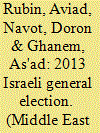

|
|
|
|
|
| Publication |
2014.
|
| Summary/Abstract |
Despite resulting in a different party configuration, the results of the 2013 Israeli general election support a similar agenda to the one set by the previous government. A year following its establishment, all indicators suggest that the current government continues to deepen neoliberal policies. Nevertheless, this election reflects two important trends: first, an ever growing discontent in Israeli public that probably would not find a solution during the tenure of the incoming government; second, lack of interest in the Israeli-Palestinian conflict that might generate negative long-term consequences.
|
|
|
|
|
|
|
|
|
|
|
|
|
|
|
|
| 2 |
ID:
130170


|
|
|
|
|
| Publication |
2014.
|
| Summary/Abstract |
Asia's middle powers face a trilateral dilemma stemming from their relationships with the U.S. and China. This paper uses the Australian example to examine the dilemma. It shows that Australia has bound itself to the U.S. because of domestic political factors, cost considerations, a belief that it can keep its interests separate, and its perception of regional threats. The paper then argues that others are likely to resolve their trilateral dilemmas in ways that make the regional strategic dynamic more competitive.
|
|
|
|
|
|
|
|
|
|
|
|
|
|
|
|
| 3 |
ID:
084885
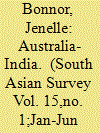

|
|
|
|
|
| Publication |
2008.
|
| Summary/Abstract |
The Australia-India relationship has reached its strongest point for many years, but it is poised at the edge of a difficult issue that may undermine all the hard work. Economic relations are very robust, with Australia's energy supplier role being increasingly important to India. Mutual strategic interests in Asia, the Indian Ocean and counter-terrorism dictate greater focus on the underdeveloped security relationship. But it is the tricky matter of uranium sales that is the big issue in bilateral relations. It has the potential to create a major rupture if a mature accommodation is not reached. Australia and India could develop a stronger and broader partnership that will benefit both but the uranium issue will be a significant challenge to overcome on the way.
|
|
|
|
|
|
|
|
|
|
|
|
|
|
|
|
| 4 |
ID:
129534
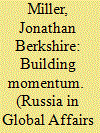

|
|
|
|
|
| Publication |
2014.
|
| Summary/Abstract |
There is clear recognition in both Moscow and Tokyo that a Sino-centric continent is not in their interests. Russia and Japan are obliged to recalculate their strategies in order to adapt for a future geopolitical realignment in Asia. Both sides recognize the stakes and that the rules of the game are no longer static.
Amid debate about a renaissance of U.S. power in Asia, Russian President Vladimir Putin has been thinking about his own "pivot" or "rebalance" to the Far East. Russia has always maintained its historical legacy as a Pacific power, but realistically this has largely been ignored for decades. Japan meanwhile has been challenged vigorously this past year by China, and to a less extent, South Korea and Russia, on its territorial disputes. This, coupled with China's increased assertiveness on security policy in the region, has created an environment with new challenges that Japan, the U.S. and Russia must confront. Japan and Russia especially are facing an uncertain future as Asia continues to morph into the most strategically important region in the world.
|
|
|
|
|
|
|
|
|
|
|
|
|
|
|
|
| 5 |
ID:
130608
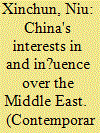

|
|
|
|
|
| Publication |
2014.
|
| Summary/Abstract |
The Middle East became a critical region for China after 1993, when The Beijing became a net oil importer. From this point, it became enmeshed in the complicated regional situation. And so China must realize its basic interests and policy objectives in the Middle East as well as set up an overall, balanced, clear and long-term strategic framework. Policy choices should be made in accordance with such factors as diplomatic tradition, national strength and political ideology
|
|
|
|
|
|
|
|
|
|
|
|
|
|
|
|
| 6 |
ID:
133612
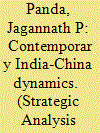

|
|
|
|
|
| Publication |
2014.
|
| Summary/Abstract |
This review essay examines the significance of India-China relations against the background of the current phenomenon of a multipolar world in the light of four recent publications on the subject. Tien-sze Fang's and Jeff M. Smith's works discuss the current facets of India-China relations, while William Antholis's and Carl J. Dahlman's works deal with the character and standing that India and China bring to their regional and global discourse. After reviewing the core of these books, this essay will seek to locate the dialogue and import of India-China relations in two constructive settings: first, the versatility of this relationship in a multipolar world order; second, why this relationship is important to the future of multipolar world politics. In the official idiom, India-China dynamics are not confined to the bilateral ambience. For example, a joint statement issued on the occasion of the visit of Premier Li Keqiang to India (May 20, 2013) records that 'There is enough space in the world for the development of India and China … As the two largest developing countries in the world, the relationship between India and China transcends bilateral scope and has acquired regional, global and strategic significance'.1 This official endorsement comes against the background that the year 2014 is the 60th anniversary of the occasion when the Panchasheel discourse was first enunciated.
|
|
|
|
|
|
|
|
|
|
|
|
|
|
|
|
| 7 |
ID:
133126
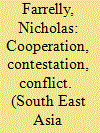

|
|
|
|
|
| Publication |
2014.
|
| Summary/Abstract |
In the period of social and political transformation that followed the election of President Thein Sein, ethnic politics remained a major preoccupation for the Myanmar government, ethnic peoples and the international community. Explaining the varieties of ethnic political interests that are emerging requires a new analytical framework in which the nascent electoral system is given adequate attention. This article argues that cooperation and contestation are now vying with conflict as primary drivers of ethnic politics. To account adequately for the interaction of these concepts, the article introduces various pieces of evidence concerning the different manifestations of ethnic political interests today. It describes an ambiguous situation in which the overall pattern of ethnic politics is changing rapidly. The challenge remains of fully reconciling Myanmar's diverse peoples and including them in one political system.
|
|
|
|
|
|
|
|
|
|
|
|
|
|
|
|
| 8 |
ID:
132495
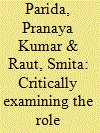

|
|
|
|
|
| Publication |
2014.
|
| Summary/Abstract |
Each day, natural disasters such as ?oods, earthquakes and hurricanes/ cyclones threaten human life and cause severe environmental losses around the world. During the last decade, disasters have affected the lives and assets of almost 2.4 billion people across the world (OCHO, 2010). In India alone since the year 2000, an average 65 million people have been affected by disasters every year. Of this, 8.45 million have been children under the age of ?ve and 3.25 million are pregnant and lactating mothers (UNICEF). Such
humanitarian crises often set back the developmental gains of lesser developed regions by several" decades. Not only do disasters lead to the loss of life and property, but "the immediate a?ermath is a complex situation complicated by issues of logistics, search and rescue, relief distribution, limited accessibility to some of the affected areas, the threat of secondary disasters, the mostly well-intentioned interests of diverse stakeholder groups (which many a times are external to the context of thedisaster), the in?ow of aid material and grants, political interest, media interest and often limited administration capacity. Government is responsible for administrative arrangements dealing with disasters.- Effective policies play a vital role in mitigating the impact of disasters and reducing likely losses of life and property ( Erramilli, 2008) . The disaster management, which is not being treated as a sector by itself, is
undergoing major changes, especially at the institutional and policy levels, which are prompted by various. macro-level factors ( Wagle and Warghade, 2006). Effective coordination among various stakeholders, specifically the Government, the international community and nongovernmental organizations (NGOS) in the aftermath of a disaster is critical to, among other things, a minimization in disaster response time, the proper allocation of resources and the avoidance of duplication of response efforts; Moreover, as economic growth and sustainable development are essential to successful disaster preparedness and mitigation efforts, effective coordination has the potential to strengthen the link between emergency response, preparedness and long-term development strategies.
|
|
|
|
|
|
|
|
|
|
|
|
|
|
|
|
| 9 |
ID:
132497
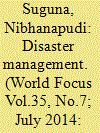

|
|
|
|
|
| Publication |
2014.
|
| Summary/Abstract |
Hundreds of Natural disasters take place worldwide every year causing irreparable damage to life and property. Earthquakes, ?oods, typhoons, hurricanes,- Tsunamis are among the worst of these natural disasters. Over the last few decades, there has been an alarming increase in the occurrence of natural disasters and the magnitude of their social, economic and environmental impact. During any natural disaster it is usually the" children who suffer the most. The nation witnessed the death of nearly a thousand children during the 2001 Bhuj earthquake. Out of them, 300 died while marching for the Republic day parade. They were in a narrow lane when the earthquake hit causing buildings onboth sides to collapse. It is said thatpnearly 1,884 school buildings collapsed leading to a loss of 5,950 class rooms. About 12000 schools suffered damages making them un?t for children to continue their studies. Fire tragedies, like the one in Kurnbakonam killed 93 children in a school. Another ?re accident in Dabwali, Haryana where a ?re broke out during a schoolfunction took he lives of many school children. Children in schools are the 'most vulnerable group during any disaster. These tragedies reiterate the need for all of us to sit up and think about the safety of these children. It is necessary to make schools safe and hazard proof. For this purpose, it is important to have disaster management, emergency preparedness and response plans at school level.
|
|
|
|
|
|
|
|
|
|
|
|
|
|
|
|
| 10 |
ID:
132498
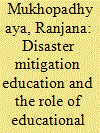

|
|
|
|
|
| Publication |
2014.
|
| Summary/Abstract |
Disasters are increasing exponentially. The number of disaster events which was 73 in 1900-09 has increased to 4494 during 2000-09. More people were affected in the two recent decades than the earlier ones. During the second half of the 20th century, more than 200 major natural disasters occurred in different parts of the world and claimed the lives of around 1.4 million people. In 2011 alone, 302 hazards resulted in disasters that claimed almost 30,000 lives, affected 206 million people and in?icted damages worth an estimated USS 366 billion, according to the United Nations Office for Disaster Risk Reduction.
|
|
|
|
|
|
|
|
|
|
|
|
|
|
|
|
| 11 |
ID:
131642
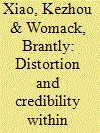

|
|
|
|
|
| Publication |
2014.
|
| Summary/Abstract |
Behind the problems of credibility of public official information in China lie two patterns of internal information distortion, one restricting the downward flow of sensitive general information and the other filtering the upward flow of local information. Information gathered at the center is increasingly restricted as it is transmitted down the bureaucracy. Meanwhile, the 'facts on the ground' are sifted by local official interests at each level of upward transmittal. Awareness of these distortions has been increased by the Internet revolution, but the structures that encourage them remain in place. An empirical survey of different levels of local cadres in Guangdong Province indicates the different perspectives produced by different positions in the internal information system. Municipal level officials, who have more general information but less diverse local information, tend to be more positive about the quality and objectivity of statistics, while their staff members, further from central sources but closer to messy local realities, are more skeptical.
|
|
|
|
|
|
|
|
|
|
|
|
|
|
|
|
| 12 |
ID:
132555
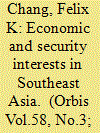

|
|
|
|
|
| Publication |
2014.
|
| Summary/Abstract |
Despite worries that ASEAN is becoming weak, the organization remains as strong as it ever was, given the parameters of its design. Its member countries still tightly embrace the organization's principles, the "ASEAN way." But simple adherence to those principles can be problematic. ASEAN countries, whose national economic and political interests collide, often appeal to the same principles to back their positions. That tends to pull ASEAN in different directions. Great power policies, particularly those of China and the United States, now exacerbate the situation. At the same time, ASEAN's reliance on multilateral consensus has made it difficult to reconcile real differences among its member countries or develop unified regional responses. That can be seen in issues from the Xayaburi dam on the Mekong River to the South China Sea. The ease with which ASEAN's principles can come into conflict and its consensus-driven decision- making can become deadlocked clearly marks the limits of the "ASEAN way."
|
|
|
|
|
|
|
|
|
|
|
|
|
|
|
|
| 13 |
ID:
132413
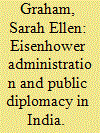

|
|
|
|
|
| Publication |
2014.
|
| Summary/Abstract |
The United States-India relationship was fraught with misapprehension and ideological disagreement during the 1950s. Public diplomacy provides a valuable context for examining these dynamics. This analysis assesses the planning, deployment, and reception of American public diplomacy to India under President Dwight Eisenhower, a period encompassing Washington's 1954 alliance with Pakistan and economic aid to India in 1957-1958. Public diplomacy reflects the Administration's difficulty in clarifying its interests in India. The rhetorical and moralising approach of India's leadership, and their prominence in the global non-aligned movement, contributed greatly to this ambivalence. Public diplomacy planning highlights Washington's difficulties in confronting India's identity in world politics; it struggled to craft messages on racial attitudes, consumerism, and Communism, whilst Soviet public diplomacy gave strong competition throughout the period. At the same time, several aspects of American public diplomacy resonated with Indian audiences, indicating that there was the possibility of a closer American relationship with India had Washington taken a different high policy approach to the region.
|
|
|
|
|
|
|
|
|
|
|
|
|
|
|
|
| 14 |
ID:
133275
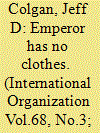

|
|
|
|
|
| Publication |
2014.
|
| Summary/Abstract |
Scholars have long debated the causal impact of international institutions such as the World Trade Organization or the International Monetary Fund. This study investigates Organization of Petroleum Exporting Countries (OPEC), an organization that purports to have significant influence over the market for the world's most important commodity-petroleum. Using four empirical tests, I find that OPEC has little or no impact on its members' production levels. These findings prompt the question of why so many people, including scholars, believe in OPEC's influence over the world's oil supply. The idea of OPEC as a cartel is a "rational myth" that supports the organization's true principal function, which is to generate political benefits for its members. One benefit it generates is international prestige. I test this idea using data on diplomatic representation and find that OPEC membership is associated with increased international recognition by other states. Overall, these findings help one to better understand international regimes and the process of ideational change in world politics.
|
|
|
|
|
|
|
|
|
|
|
|
|
|
|
|
| 15 |
ID:
129485
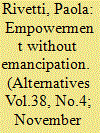

|
|
|
|
|
| Publication |
2013.
|
| Summary/Abstract |
This article examines the centrality of political activism in the identity of Iranian refugees and investigates how they perform and incorporate it by considering the interlocked pressure of international politics, personal networks, and the assistance provided by civil society organizations. The case of Iranian political refugees in Italy and Turkey is of particular interest because of the international visibility of the Green movement, the Iranian people's historical experience of emigration, and the fact that Iran is a subject of great interest for a number of human rights nongovernmental organizations (NGOs). It shows how the process of "being a refugee" works not only through classical forms of institutional pressure but also through "unexpected" forms such as NGO efforts to empower refugees politically. Despite the positive value attached to it, in this context political activism can force refugees into preestablished roles, such as "human rights defenders" or "Green movement activists." Paradoxically, refugees act within a context that dominates them even when it tries to empower them.
|
|
|
|
|
|
|
|
|
|
|
|
|
|
|
|
| 16 |
ID:
133596
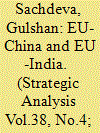

|
|
|
|
|
| Publication |
2014.
|
| Summary/Abstract |
More than a decade has passed since the European Union (EU) signed strategic partnerships with China (2003) and India (2004). The EU's 'honeymoon' with China was over within a few years while cooperation on truly strategic issues with India is yet to emerge. The core of both these relationships is still economics. While China has taken full advantage of the EU's institutional mechanism through more than 56 sectoral dialogues to promote its geopolitical goals and also to neutralise European concerns about democracy and human rights, Indian policy makers and analysts remain sceptical about Europe's role in global affairs. As a result, they have not bothered to use European capacities to promote their own interests through this partnership.
|
|
|
|
|
|
|
|
|
|
|
|
|
|
|
|
| 17 |
ID:
133713
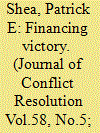

|
|
|
|
|
| Publication |
2014.
|
| Summary/Abstract |
With access to inexpensive credit, states can finance wars without overburdening their constituents, and face relatively small short-term costs compared to states with poor credit access. As a result of these economic benefits, states with lower credit costs will be more likely to win their wars, ceteris paribus. However, lower borrowing costs provide states domestic political benefits, which I argue are more important for democracies than nondemocracies. Since expensive credit forces states to rely on its citizens for revenue, governments that are more sensitive to their citizens' preferences are at a disadvantage. In sum, I argue that democracies are more sensitive to credit costs than authoritarian regimes. To test this theory, this article analyzes a data set of wars using logistic regressions and matching techniques, and examines the case of the Chaco War. The results demonstrate that the costs of borrowing have a substantial effect on war outcomes, and that these costs are more important for democracies than nondemocracies.
|
|
|
|
|
|
|
|
|
|
|
|
|
|
|
|
| 18 |
ID:
089383
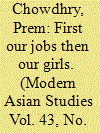

|
|
|
|
|
| Publication |
2009.
|
| Summary/Abstract |
In the post-colonial shifting of material, legal and ideological bases, some of the given patterns of relationships between individuals and caste groups have changed and weakened because of the introduction of new, parallel and alternative structures of relationships. This change has left the dominant caste groups feeling palpably insecure in relation to the dalits. While delineating this relationship, this article seeks to argue that the cases of dalit and dominant/upper caste members' elopement and marriage represent a high point in the ongoing conflictual relationship between them, as these are viewed as forms of dalit assertion. Although many caste groups and communities are involved in inter-caste marriages and associations that defy customary norms and caste practices and have no social acceptance, it is in relation to a dalit and non-dalit association or marriage that certain aspects, which impinge on wider issues, come to the surface more pronouncedly. For the dominant caste groups such associations remain the most viable and potent issues to garner a wider collective support, cutting across class/caste/community and age divides. These cases are selectively made a public spectacle by the dominant caste groups to settle wider issues at stake verging on contemporary political and economic interests.
|
|
|
|
|
|
|
|
|
|
|
|
|
|
|
|
| 19 |
ID:
123388
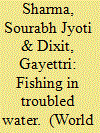

|
|
|
|
|
| Publication |
2013.
|
| Summary/Abstract |
Although there are positive signs of a big power playing an important and responsible role in a war ravaged country in its aftermath, China's foray in Afghanistan reflects that it is walking a diplomatic tightrope in Afghanistan. It is trying hard to maintain a silent but highly strategic presence in the country while at the same time managing its relations with other actors present in Afghanistan. However, as the date of US-NATO exit plan by the end of 2014 approaches; the politics between various domestic, regional, and international actors get surcharged.
|
|
|
|
|
|
|
|
|
|
|
|
|
|
|
|
| 20 |
ID:
138001
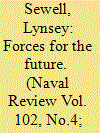

|
|
|
|
|
| Summary/Abstract |
Having spent a six-week study period in Australia courtesy of the 2014 Naval Journal's fellowship award.
|
|
|
|
|
|
|
|
|
|
|
|
|
|
|
|
|
|
|
|
|